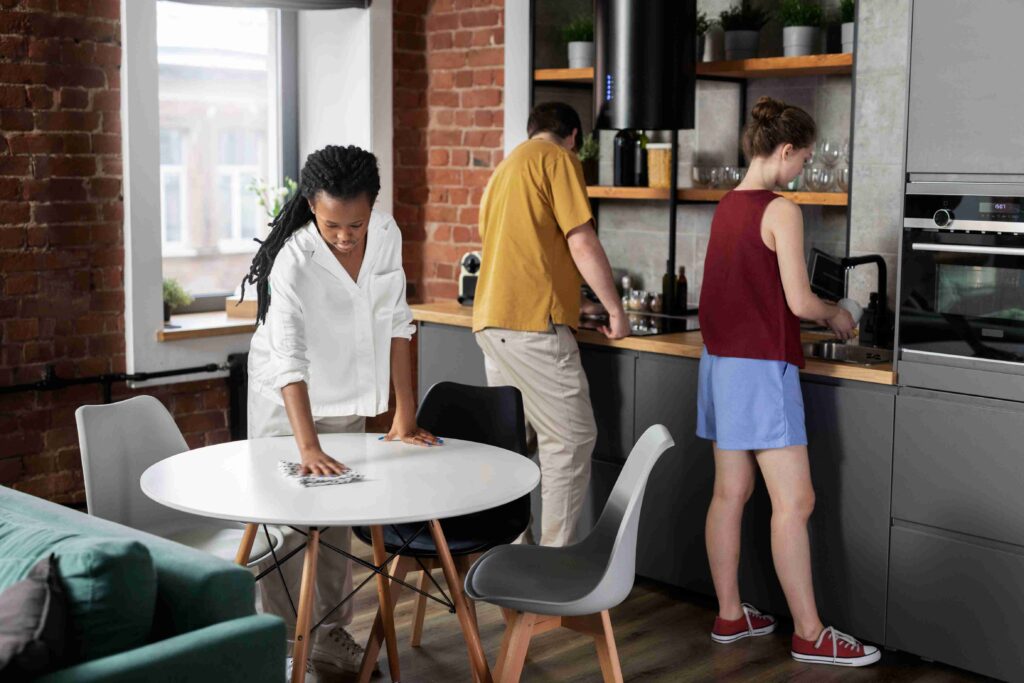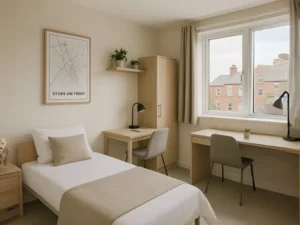Shared accommodation is a popular living arrangement, especially for students, young professionals, and those looking to save on housing costs. It involves sharing a home with others, where common spaces like the kitchen, living room, and bathroom are used by all tenants. While it can be a cost-effective and social experience, living in shared accommodation comes with its own set of challenges. Understanding and considering key factors such as personal space, cleanliness, and communication are essential for ensuring a harmonious living environment. This blog aims to provide practical tips that can help make shared living more enjoyable and stress-free for everyone involved, allowing you to navigate potential issues with ease and build positive relationships with your housemates.
1. Understanding the House Rules

When living in shared accommodation, clear communication about house rules is vital. It helps prevent misunderstandings and keeps everyone on the same page. Agreeing on basic rules around noise levels, cleaning duties, and guest policies is essential. For example, a cleaning schedule can ensure that shared areas like the kitchen, bathroom, and living room stay tidy without placing the burden on one person. Discussing quiet hours can help avoid disruptions, especially if housemates have different work or study routines. Establishing clear expectations for the use of communal spaces like the kitchen is also crucial. Knowing when others need the space can prevent clashes and make shared living more comfortable.
2. Respecting Personal Space and Privacy
While shared accommodation means living with others, it’s important to balance communal life with personal privacy. Setting boundaries early on is key to avoiding discomfort. You should communicate your preferences about personal items, and rooms should be treated as private spaces unless access is given. It’s equally important to respect your housemates’ privacy by being mindful of noise levels and giving them space when needed. Shared areas, like the living room, should be used with consideration, ensuring that everyone feels comfortable using them. Simple things, like knocking before entering someone’s room or not borrowing personal belongings without permission, can go a long way in maintaining respect and harmony.
3. Budget and Expenses

Money matters can often cause tension in shared living arrangements if not handled well. It’s important to be clear about how rent, utilities, and other expenses will be divided. For shared accommodation, splitting the cost of electricity, gas, water, and the internet should be agreed upon at the start. You may also want to share the cost of common household items such as cleaning supplies or kitchen essentials. Discussing these things beforehand ensures that everyone knows what they are responsible for. Setting up a simple system, such as a shared expenses app or a regular contribution towards these costs, can make managing finances easier and avoid potential conflicts.
4. Communication and Conflict Resolution
Open communication is the foundation of any successful shared accommodation. Talking openly with your housemates about any concerns or preferences can help avoid problems later on. If issues do arise, whether about cleanliness, noise, or visitors, addressing them early and respectfully is the best approach. It’s important to remain calm and look for compromise, ensuring that everyone feels heard and respected. Resolving conflicts through direct conversation rather than letting tensions build up helps maintain a positive living environment. A small disagreement over dishes or loud music doesn’t have to turn into a bigger problem if you approach it with patience and understanding.
5. Hygiene and Cleanliness

Cleanliness is often a common source of frustration in shared accommodation. Everyone has different standards, so agreeing on a cleaning routine from the start is crucial. Keeping shared areas, like the kitchen and bathroom, clean is a collective responsibility. Establishing a rota or assigning specific tasks ensures everyone contributes equally. Simple practices like washing up dishes after use and wiping down surfaces help prevent the build-up of mess. Personal responsibility is also key, taking care of your own things and not leaving them around communal areas can help keep the space organised and pleasant for everyone. Good hygiene and cleanliness make for a more harmonious living environment.
6. Security and Safety
Shared accommodation also means shared responsibility for security. It’s important to lock doors when leaving the property and not share keys with anyone outside the household. Discussing how to manage guests is also necessary to ensure everyone feels secure. In case of emergencies, it’s helpful to have a plan in place, such as knowing who to contact or what to do if an issue arises in the home. Creating a secure and safe living space is essential for everyone’s peace of mind. A little extra care in locking doors or securing windows can go a long way in preventing potential problems.
7. Socialising and Respecting Differences

Living with housemates offers a great opportunity to socialise and build friendships, but it’s also important to respect each other’s differences. Everyone has their own background, culture, and lifestyle, so being open-minded and respectful is key. Engaging in social activities with housemates can help foster a friendly and supportive environment. However, it’s important to respect people’s personal space and schedules. Some housemates may prefer quieter time to themselves, while others may be more social. Balancing these different needs creates a more harmonious and pleasant living experience. Socialising and bonding with your housemates can make shared accommodation much more enjoyable, but respect for each other’s boundaries is equally important.
Read Also: How to Find Affordable Accommodation in Stoke on Trent
Conclusion:
In conclusion, living in shared accommodation comes with both benefits and challenges, requiring careful consideration of aspects like house rules, finances, and personal space. By fostering clear communication and mutual respect, individuals can create a harmonious environment where everyone feels comfortable. Setting boundaries, sharing responsibilities, and addressing conflicts promptly are essential steps to ensure a positive living experience. While managing shared spaces can sometimes be challenging, approaching these situations with cooperation can help unlock the full advantages of shared living, such as affordability and community. For those looking to enhance their shared living experience, Verta Suites offers premium accommodations in Stoke on Tren with thoughtfully designed spaces and amenities tailored for comfort and ease, making shared living both enjoyable and stress-free.




